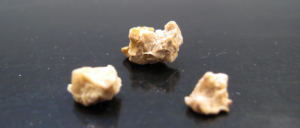
What causes a person to develop kidney stones has long been debated. A recent study found that in persons who develop kidney stones, there are alterations in the gut, salivary, and urinary microbiomes. In other words, the community of fungi, viruses, and bacteria at each of these sites are out of whack or imbalanced.
In the study, not only were the 3 microbiomes imbalanced in the persons with kidney stones (when compared to healthy people without kidney stones), but they also had less diversity (fewer species) in their microbiomes. For example, persons with kidney stones had significantly fewer gut health associated bacteria F. prausnitzii, and significantly more inflammation associated E. lenta.
Those with kidney stones also had a history of having taken more antibiotics (antimicrobials).
The researchers conclusion: To avoid kidney stones a healthy diet is essential (for a healthy gut microbiome). One should also avoid taking antibiotics unless necessary. [BTW, the bacteria F. prausnitzii has long been viewed as a keystone microbe in a healthy gut microbiome. It can be increased by increasing fiber in the diet - e.g., fruits, vegetables, seeds, nuts, whole grains, legumes.]
From Medical Xpress: New study sheds light on the connection between the microbiome and kidney stones
A new study from Lawson Health Research Institute and Western University published in the journal Microbiome has found changes in the microbiome in multiple locations in the body are linked to the formation of kidney stones.
The human microbiome comprises trillions of microorganisms, including healthy bacteria. In recent years, research has begun to uncover its role in health and numerous diseases.
The research team examined the gut, urinary and salivary microbiomes in 83 patients who had kidney stones and compared them to 30 healthy controls. They found changes in all three microbiomes were linked to kidney stone formation.
"Kidney stone disease has been rising in recent years, affecting roughly 10 per cent of people," says Dr. Jeremy Burton, Lawson Scientist and Research Chair of Human Microbiome and Probiotics at St. Joseph's Health Care London (St. Joseph's).
Study participants included people who had formed kidney stones, had not had antibiotic exposure in the last 90 days, and were having the stones removed surgically at St. Joseph's.
"Our testing—called shotgun metagenomic sequencing—allowed us to discover which bacteria were present in the gut and the genetic capabilities of those bacteria, or how they function. We also did a simpler sequencing of the oral and urinary samples," explains Dr. Kait Al, lead author on the study and Postdoctoral Research Fellow at Western's Schulich School of Medicine & Dentistry.
Kidney stones are most commonly formed from calcium oxalate, which is a waste product produced by the body. Historically, it was thought people with specific gut microbes, like one bacterium called Oxalobacter formigenes that breaks down oxalate, were less likely to form kidney stones. This study suggests there are other factors.
"It's a more complex story. The microbes form a kind of network that's stable and beneficial in healthy people, but in those with kidney stones, that network is broken down. They're not producing the same vitamins and useful metabolites, not just in the gut but also in the urinary tract and oral cavity," Dr. Al explains.
There was also evidence that those with kidney stones had been exposed to more antimicrobials, as they had more antibiotic-resistant genes.
The research team says that although more research is needed, these initial findings shed light on the overall importance of a person's microbiome and keeping it as healthy as possible, with a microbiome-friendly diet and minimal antibiotic use potentially part of the solution.
